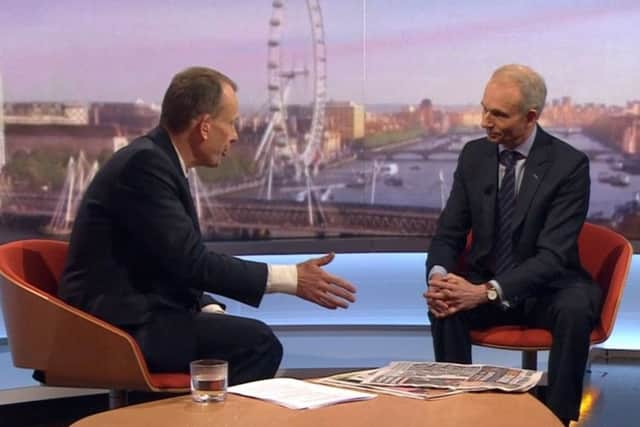Brexit: Theresa May faces ‘grassroots revolt’ as calls to quit grow
The Tory leader has already announced she will be leaving office when the current phase of talks are over and former leader Iain Duncan Smith yesterday said she should quit before European Parliament elections on 23 May.
Meanwhile Conservative grandees raised the prospect of a change in rules governing challenges to the party leader, suggesting Mrs May could face an imminent leadership contest despite staving off a challenge last December.
Advertisement
Hide AdAdvertisement
Hide AdA new poll yesterday showed the Tories would lose 59 MPs if there was a snap general election. Those at risk of being ejected from the House of Commons included Mr Duncan Smith and Work and Pensions Secretary Amber Rudd.


A six-month delay to Brexit was agreed last week meaning the UK must fight the European elections. This could be averted if Tories could agree on a compromise with Labour that would see a Brexit deal backed in the Commons. Mr Duncan Smith warned that dozens of Conservative associations have written to Mrs May saying the party cannot fight the European elections. Asked whether there could be a “grassroots revolt”, he told Sky News: “There already is, to be quite frank.”
Mr Duncan Smith said: “I know that the Prime Minister has already said she’s going. She said she would go as and when the agreement was ratified which was looking at around about May, June. I think those dates still stand.
“What the PM has to do is aim everything now towards departure before the elections. This would then allow her to step away, having done what she said she would do, getting the UK out of the European Union. Then we can have another leadership election and pick a new leader.”
He added that polling figures for the party were “concerning” and blamed the extension of the UK’s date of departure from the EU to 31 October.
“It was on March 29 when we didn’t leave, that’s when this has all gone wrong. Up until then people were prepared to give Theresa May the benefit of the doubt.
“The big problem was as soon as we didn’t leave you could see all the poll ratings start to crash.
“When we didn’t go it looked like a complete breach with the pledge that we had made and that’s a disaster for a political party.”
Advertisement
Hide AdAdvertisement
Hide AdCabinet Office Minister, and Mrs May’s de facto deputy, David Lidington, said talks between the government and Labour on Brexit would continue this week.
He told the BBC’s Andrew Marr Show: “I had a good, business-like meeting with John McDonnell a couple of days ago, and what we have agreed is a programme of meetings next week on particular subjects with the ministers and shadow ministers getting together to talk about things like environmental standards, like workers’ rights, like security relationships between the United Kingdom and the EU.
“And then we would hope to take stock of where we are as soon as Parliament gets back after the Easter recess.
“But I don’t think that this question can be allowed to drag out for much longer.”
Mr Lidington said: “We have always made it clear that while we will do our best to try and reach a compromise with the main opposition party, it would mean compromise on both sides.
“If that doesn’t work then what we will want to move towards is to put before Parliament a set of options with a system for making a choice and Parliament actually having to come to a preferred option, rather than voting against everything.
Mr Duncan Smith’s remarks came after Tory grandees raised the possibility of a change in the rules governing challenges to the party leader.
Under the current system, a move against the leader can only be brought once in a 12-month period.
Advertisement
Hide AdAdvertisement
Hide AdMrs May saw off a bid to oust her last December and so would not expect to face the risk of another possible attempt to topple her until the end of the year.
However, two former chairmen of the 1922 Committee of backbench Tory MPs said rules could be changed.
Writing in the Sunday Telegraph, Lord Spicer and Lord Hamilton of Epsom said the 12-month rule on no confidence votes had been “interpreted as being immovable”.
“It is reported that in order to change this rule the whole Conservative Party constitution must be opened, a National Convention called and even that a petition of 10,000 members is required. This is not the case,” they said.
Insisting that party rules were “not the master”, they added: “Conservative MPs are responsible for their party. If they wish to change these rules, there is nothing standing in their way.”
Current chairman of the 1922 Committee, Sir Graham Brady, told the paper: “It is my understanding that the rules could in future be changed by the agreement of the 1922 executive.”
He added that it was “less certain that it would be possible to change the rules during the current period of grace which was initiated with the triggering of a confidence vote on December 12 last year”.